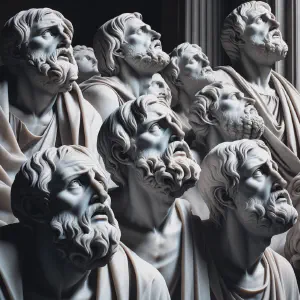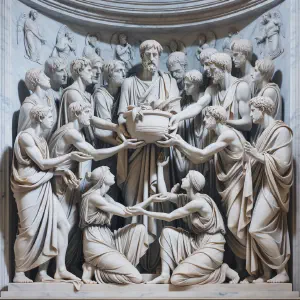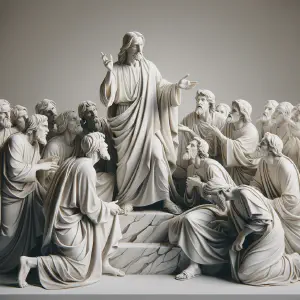The Call to Vigilance

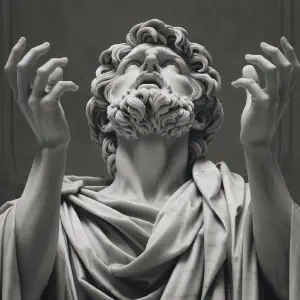
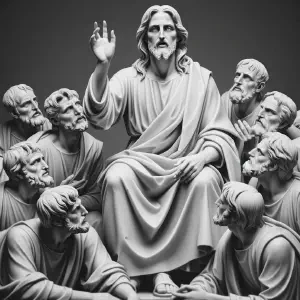
In the Gospel, Jesus imparted a vital lesson to His disciples, urging them to be watchful and alert, for the time of His coming was unknown. He likened it to a man traveling abroad, entrusting his servants with responsibilities, each with their own work, and commanding the gatekeeper to remain vigilant. Jesus emphasized the necessity of constant vigilance, for the master could return at any unexpected hour. His message was clear and resounding, a call to all: ‘Watch!’
Five Questions
What is the significance of the people acknowledging their sins and describing themselves as clay in the hands of the potter in Isaiah’s passage?
The acknowledgment of sins and the imagery of being clay in the hands of a potter signifies a deep recognition of human fallibility and dependence on God’s mercy. It reflects a humble acceptance of God’s sovereignty and creative power, emphasizing that just as a potter shapes clay, God shapes our lives and destinies. This confession and metaphor illustrate a profound desire for God’s guidance and transformative work in the human heart.
How does the Psalmist’s plea for God to tend to His vine relate to the overall theme of repentance and redemption?
The Psalmist’s plea is a metaphorical representation of the people of Israel as God’s vineyard, needing care and nurturing. By asking God to look down from heaven and tend to this vine, it reflects a yearning for divine intervention and restoration. This plea aligns with the themes of repentance and redemption as it acknowledges God’s role as the ultimate caretaker and redeemer who can revive and strengthen His people, leading them back to righteousness.
In Paul’s letter to the Corinthians, how does the emphasis on grace and spiritual gifts contribute to the message of these readings?
Paul’s emphasis on grace and spiritual gifts in his letter to the Corinthians underscores the idea that our spiritual enrichment and abilities are gifts from God, not achievements of our own. This aligns with the theme of dependency on God seen in the other readings. By highlighting that these gifts are meant to prepare us for the revelation of Christ, Paul ties in the concept of vigilance and readiness for God’s ultimate plan, complementing the call to watchfulness in the Gospel of Mark.
What lesson does Jesus impart in the Gospel of Mark about vigilance, and how is this relevant to Christians today?
In the Gospel of Mark, Jesus teaches the importance of vigilance and preparedness for His return, which is unpredictable. This lesson is crucial for Christians as it calls for a constant state of spiritual readiness, living in a manner that is pleasing to God at all times. It’s a reminder that our actions and choices should reflect our faith, as we do not know when we will be called to account. This message is timeless and highly relevant, urging Christians to live with purpose and awareness of God’s imminent presence.
How do these scriptures collectively guide a Christian’s understanding of their relationship with God and their responsibilities as believers?
Collectively, these scriptures guide Christians to understand their relationship with God as one marked by humility, repentance, and an ongoing need for God’s grace and guidance. They emphasize our role as recipients of God’s mercy, shaped by His will, and remind us of our duty to remain spiritually vigilant and prepared. These readings reinforce the notion that our faith journey is a continuous process of seeking God’s face, acknowledging our shortcomings, and living in anticipation of Christ’s return, thereby shaping our actions and attitudes as believers in everyday life.
Bible Study
Isaiah 63:16b-17, 19b; 64:2-7
You, LORD, are our father,
our redeemer you are named forever.
Why do you let us wander, O LORD, from your ways,
and harden our hearts so that we fear you not?
Return for the sake of your servants,
the tribes of your heritage.
Oh, that you would rend the heavens and come down,
with the mountains quaking before you,
while you wrought awesome deeds we could not hope for,
such as they had not heard of from of old.
No ear has ever heard, no eye ever seen, any God but you
doing such deeds for those who wait for him.
Would that you might meet us doing right,
that we were mindful of you in our ways!
Behold, you are angry, and we are sinful;
all of us have become like unclean people,
all our good deeds are like polluted rags;
we have all withered like leaves,
and our guilt carries us away like the wind.
There is none who calls upon your name,
who rouses himself to cling to you;
for you have hidden your face from us
and have delivered us up to our guilt.
Yet, O LORD, you are our father;
we are the clay and you the potter:
we are all the work of your hands.
This passage, authored by the prophet Isaiah, addresses the Israelites’ relationship with God during a period of suffering and exile. Isaiah, known for prophesying the coming of the Messiah, here reflects on human sinfulness and God’s role as a redeemer. The text aligns with Catholic values by highlighting themes of repentance and God’s mercy, resonating with the sacrament of reconciliation and the act of contrition. It underscores the need for God’s intervention in human affairs, paralleling the Catholic emphasis on divine grace and providence.
Psalm 80:2-3, 15-16, 18-19
R. (4) Lord, make us turn to you; let us see your face and we shall be saved.
O shepherd of Israel, hearken,
from your throne upon the cherubim, shine forth.
Rouse your power,
and come to save us.
R. Lord, make us turn to you; let us see your face and we shall be saved.
Once again, O LORD of hosts,
look down from heaven, and see;
take care of this vine,
and protect what your right hand has planted
the son of man whom you yourself made strong.
R. Lord, make us turn to you; let us see your face and we shall be saved.
May your help be with the man of your right hand,
with the son of man whom you yourself made strong.
Then we will no more withdraw from you;
give us new life, and we will call upon your name.
R. Lord, make us turn to you; let us see your face and we shall be saved.
This Psalm, traditionally attributed to Asaph, a Levite musician, implores God to rescue and restore His people, Israel. It presents God as a shepherd and caretaker, a recurring biblical motif that aligns with Catholic teachings on God’s pastoral care for His people. The Psalm’s plea for salvation and God’s intervention mirrors Catholic doctrines on God’s active role in human history and the need for His grace. It also reflects the concept of intercessory prayer, a significant aspect of Catholic spirituality.
1 Corinthians 1:3-9
Brothers and sisters:
Grace to you and peace from God our Father
and the Lord Jesus Christ.
I give thanks to my God always on your account
for the grace of God bestowed on you in Christ Jesus,
that in him you were enriched in every way,
with all discourse and all knowledge,
as the testimony to Christ was confirmed among you,
so that you are not lacking in any spiritual gift
as you wait for the revelation of our Lord Jesus Christ.
He will keep you firm to the end,
irreproachable on the day of our Lord Jesus Christ.
God is faithful,
and by him you were called to fellowship with his Son,
Jesus Christ our Lord.
Written by Paul the Apostle to the Corinthians, this passage addresses early Christians in Corinth. Paul, a central figure in the spread of Christianity, emphasizes God’s grace and the gifts bestowed upon believers. This aligns with Catholic teachings on the charisms and fruits of the Holy Spirit, as outlined in the Catechism. Paul’s assurance of God’s faithfulness and the call to fellowship with Jesus Christ reflect Catholic values of community, unity in Christ, and the perseverance of faith, resonating with Catholic understandings of ecclesiology and soteriology.
Mark 13:33-37
Jesus said to his disciples:
“Be watchful! Be alert!
You do not know when the time will come.
It is like a man traveling abroad.
He leaves home and places his servants in charge,
each with his own work,
and orders the gatekeeper to be on the watch.
Watch, therefore;
you do not know when the lord of the house is coming,
whether in the evening, or at midnight,
or at cockcrow, or in the morning.
May he not come suddenly and find you sleeping.
What I say to you, I say to all: ‘Watch!’”
In this passage from the Gospel of Mark, Jesus Christ, the central figure of Christianity, instructs His disciples on the importance of vigilance. This teaching aligns with Catholic values of living a life of preparedness for Christ’s second coming, as emphasized in the catechism and eschatological teachings. The call to be watchful mirrors the Catholic practice of continual self-examination and readiness for the sacraments, especially reconciliation. It underscores the importance of constant spiritual awareness and readiness in Catholic faith.
Lessons
These sacred passages remind us of the profound need for humility and repentance in our walk with God. They teach us that we are like clay in the hands of our Divine Potter, shaped by His will and mercy. The psalmist’s plea for God’s intervention and the Corinthians’ reminder of the grace found in Christ emphasize our dependence on God’s loving guidance. Above all, Jesus’ exhortation to remain vigilant and watchful in faith highlights the unpredictable nature of His return and the constant need for spiritual readiness. Thus, we are called to live in a state of hopeful anticipation, grounded in the grace and truth of our Lord Jesus Christ.
Meditation Prayer
